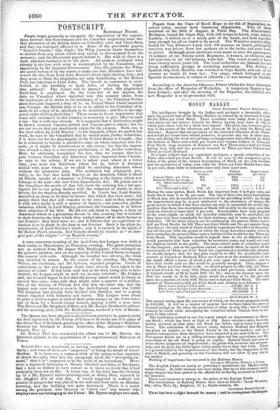POSTSCRIPT.
People begin generally to recognize the importance of the negotia- tions between this Government and the Canadian respecting some fur- ther alteration of the British duties on Canadian corn and wheat-flour, and they are variously affected by it. Some of the provincial papers, " farmer's friends," take fright ; the Whig journals bestir themselves to detract from any credit which may accrue to Government from the measure ; and the Ministerial papers defend it. But with all there is a most admired confusion as to the facts. All seem to confound what already is the law, with what is contemplated by the Canadians, and apparently by the Imperial Government. Into this mistake the Whigs are partly betrayed by the desire to make out that Ministers have bor- rowed the idea from Lord John Russell's fixed eight-shilling duty ; and they seem to think the plagiarism not only humiliating to Sir Robert Peel, but injurious to Lord John. The benefit to commerce is over- looked, in the hardship to Lord John, of having his bright idea pilfered I The reader will be amused when this plagiarized fixed-duty is explained. By the Corn-law of last session, the duty on Canadian wheat imported into this country slides from the maximum of 5s. down to the minimum of Is.: the Canadian Parlia- ment have just imposed a duty of 3s. on United States wheat imported into Canada : the British duty of Is. to 5s. added to the Canadian of 3s. make in all a duty of 4s. mininum to 8s. maximum ; and this is the sup- posed eight-shillingfred duty ! There seems to be an impression that some new enactment in this country is necessary to give effect to such a law : but it is the law already. It is supposed that a distinction might be drawn between Canada-carried and Canada-grown wheat ; but we are not aware that any machinery exists for the purpose. Such, too, is the view taken by Lord Stanley : in his despatch, which we quoted last week, he says to the Canadians that he would make further reductions, if it were not for the propinquity of the United States to Canada ; that be is reluctant to impose a protective duty on wheat imported into Ca- nada, as it might be inconvenient to the colony, but that the imposi- tion of such a duty is a necessary preliminary to the further reductions. Here he obviously recognizes the fact, that we cannot discrimi- nate between Canadian and American wheat imported from Canada : lie says to the colony, If we are to admit your wheat at a lower duty, you must tax American wheat for us, before it becomes mixed with your wheat, or we shall be admitting American wheat without the protective duty. The confusion has originated, pro- bably, in the fact that Lord Stanley, in the despatch, which is dated 2d March, speaks of a measure as belonging to the future, which now belongs to the past—the new Corn-Importation Act. He points out to the Canadians the merits of that bill, (now the existing law,) but apo- logizes for its not going further with the reduction of duties in their favour, for the reasons already specified. In March last, Lord Stanley described as about to be done in future that which has been done : but people think that that still remains to be done ; and so they confound it with what really is still a matter of futurity—the unknown further seduction, which, as Lord Stanley promised the Canadians, is to follow their adoption of his hint. He did not ask them to impose a duty on American wheat as a gratuitous favour to this country, but to transfer 'to their frontier the duty which they wished taken off in their favour at our frontier : they have done so; and it follows that an equivalent re- Auction is to be made in the duty at our frontier. Such is the plain in- terpretation of Lord Stanley's words ; and it is entirely in the spirit of Sir Robert Peel's promise, that Canada should be treated as " an inte- gral part of the empire "—" an English county."


























 Previous page
Previous page